By Florence Afriyie Mensah
Kumasi, March 14, GNA – The United Nations Industrial Development Organisation (UNIDO) and the Ghana Enterprises Agency (GEA) have called for proposals from small and medium scale enterprises in the Ashanti region to participate in the new Kaizen project.
The $3.9 million “Expanding the Kaizen Initiative by Enhancing Sustainable Agribusiness”, is a 36-month project, being funded by the government of Japan to strengthen the competitiveness of Ghanaian micro, small and medium scale and agri-business enterprises through enhanced productivity and sustainability.
It is being implemented in all the regions in Ghana with particular focus on Greater Accra, Ashanti, Bono, Ahafo, Northern Western regions.
Kaizen is a Japanese methodology and philosophy for continuous quality and productivity improvement at the shop floor level.
Mr. Marin Mizuno, Project Manager, Food Security and Food Systems Unit at UNIDO, speaking at a ceremony to launch the call for proposals in Kumasi, said in considering selection of a business, the enterprise had to be an ongoing business in the manufacturing or agribusiness sector.

The size of the enterprises must be big and the willingness of management to allocate human resource for the project.
Selection would also value and encourage enterprises whose top management included women.
Mr. Mizuno detailing other components said the project would support GEA to enhance its technical and managerial capacity to introduce the Kaizen philosophy and concepts in selected Ghanaian micro- small and medium scale enterprises to improve productivity, quality and sustainable growths.
Again, the project would introduce smart and sustainable agriculture business (SSAB) to selected Ghanaian agri-business enterprises to improve performance management and sustainability.
On the SSAB, Mr. Mizuno explained that it was a simple and user-friendly digital dashboard that helped the enterprises to improve their performance management.
“With SSAB, enterprises will be able to visualize and monitor their performance in terms of productivity, quality, energy and resource efficiency as well as the social aspects of the enterprises.”
GNA